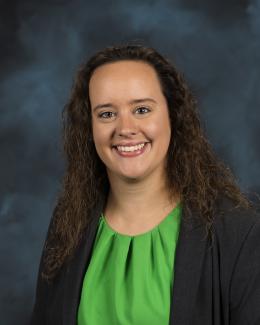Each summer for the last 30 years, students and teachers from across Appalachia have travelled to the Department of Energy’s Oak Ridge National Laboratory for a unique STEM summer camp experience – the Appalachian Regional Commission/ORNL Science-Technology-Mathematics Institute.
The program was all virtual in 2020, but its research emphasis was as strong as ever, thanks in large part to dedicated ORNL volunteers who served as mentors and guest speakers.
During the program, more than 70 students representing 13 states learned about science topics such as climate change, robotics, spatial analysis, 3D printing and video game design. Over two weeks, students examined a research question related to their group’s science topic and created digital posters and video presentations to communicate their findings.
Jake McKee and Jessica Moehl of ORNL’s National Security Emerging Technologies Division mentored a group of high school students for the second year in a row.
“We try to introduce the students to spatial reasoning and analysis, and we try to tailor it to something that’s relevant and current,” McKee said.
Their group of eight students used open-access geospatial software to determine an ideal site for a new “smart neighborhood” in Blount County, Tennessee, a project very similar to one the researchers actually worked on last year. McKee and Moehl devoted much effort towards getting students to think about the realities that utilities and local governments must consider when planning developments.
“We don’t provide a particular ‘right answer’ for them,” Moehl said. “That approach is something that they’re not going to get in their high school classrooms.”
Students in the climate change modeling and communication group heard from eight different ORNL researchers who spoke about multiple facets of climate science – from the basics of the greenhouse effect to carbon capture to the importance of the world underfoot.
“The goal of my presentation was to introduce the group to soil and its role in climate change,” said ORNL researcher Elizabeth Herndon, who was immediately interested in the program after looking for educational opportunities offered by the lab. “Soil is something we are all aware of, but most people know very little about.”
Abby Regan, a rising high school junior from Huntsville, Alabama, said she learned about the importance and variation of soils. One presentation that stuck out to her was a talk from Herndon’s colleague Colleen Iversen, an ecosystem ecologist who walked the students through her field research on ways that atmospheric and climactic change alters belowground carbon and nutrient cycling in soil and roots.
“As someone who is potentially interested in a science career, I thought it was really cool to see how a real laboratory operates,” Regan said. “I'm also glad I got to see some examples of actual scientists and people who work in a science field. It was really inspiring to me.”
Teaching teachers
Besides inspiring students, the ARC/ORNL Summer Institute gives teachers from around the region the chance to work with ORNL scientists on projects related to research at the lab. Barbara Evans, a researcher in ORNL’s Chemical Sciences Division, has led a teacher group each summer since 2015.
“This year I had to come up with something that they could actually do at home in their kitchens,” she laughed.
Teachers in her group grew tomato plants and observed over Zoom measurement of certain compounds produced by the leaves of similar plants growing in the lab, which could be used at scale to generate electricity. The goal was for the educators to participate in research while expanding their repertoires of inexpensive experiments for use in their own classrooms.
“The ARC program isn’t just providing teachers an educational opportunity during the summer, it really propagates,” Evans said. “The teachers use it to train their students, so it’s very useful and provides educational outreach to an entire school and entire community.”
Hometown advantage
Though the remote format presented unique challenges, like when Evans’ internet connection went out, it also opened up unique opportunities.
“For some of the groups, they were actually able to examine problems in their own neighborhood and gather research from their home locations, which they typically wouldn’t get to do during the in-person program,” said Chris Nelson, program manager at Oak Ridge Associated Universities.
The climate change group, for instance, used sensors provided by ORAU to measure ambient temperatures around their yards. Students in the 3D printing group, led by researchers out of Los Alamos National Laboratory, received components that allowed them to 3D print at home.
“The sensors made it more hands-on,” said Isaac Sulfridge, a rising high school junior from LaFollette, Tennessee. “It also gave us raw data that we could process ourselves. I still have mine actively recording the temperature outside.”
Though students didn’t get to peek at the nation’s fastest supercomputer or tour research reactors at ORNL, they walked away with new tools, new knowledge and hopefully – says ORNL’s Jake McKee – new confidence.
“Both Jessica and I are from smaller communities in southern Appalachia, so our number one goal was to ease any concerns students might have about growing up in a rural area, going to small schools,” McKee said. “We wanted to show them that it doesn’t matter where you’re from.”
For more information about ARC Oak Ridge Summer STEM programs, visit https://www.orau.org/arc-ornl/default.html.
UT-Battelle manages ORNL for the Department of Energy’s Office of Science, the single largest supporter of basic research in the physical sciences in the United States. The Office of Science is working to address some of the most pressing challenges of our time. For more information, please visit energy.gov/science.






